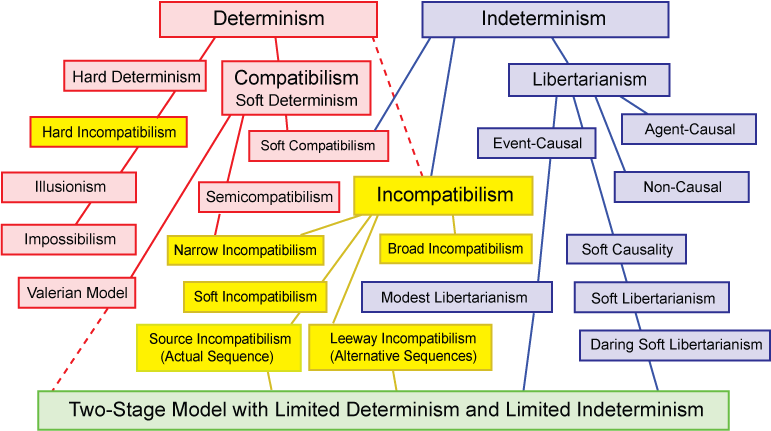Supercompatibilism
Supercompatibilism is the idea that
free will is
compatible with both
determinism and
indeterminism, in the sense that free will exists and will continue to exist whether determinism or indeterminism turns out to be true.
Supercompatibilism does for free will what
John Martin Fischer's
semicompatibilism does for
moral responsibility. Fischer was inspired by
Peter Strawson. Fischer and his colleague
Alfred Mele affirm moral responsibility and accountability for "autonomous agents" whatever the outcome of the
problem of free will and determinism.
It is sometimes said that supercompatibilism goes beyond compatibilism by
requiring determinism. Does it also require indeterminism, as does
comprehensive compatibilism? Note that
R.E. Hobart only required
determination.
Randolph Clarke suggested the term "narrow compatibilism" for Fischer's semicompatibilism to distinguish it from the original "broad compatibilism" that makes determinism compatible with both free will and moral responsibility. For Clarke, narrow compatibilism is distinguished from broad by asserting we have moral responsibility, even if determinism is true and
libertarian free will does not exist.
Note that Fischer,
Alfred Mele, and many others for whom moral responsibility is most important, are generally agnostic about the "truth" of either libertarian free will or determinism. They want moral responsibility even in the absence of "
alternative possibilities" and the idea that an agent "
could have done otherwise."
Let's look at the taxonomy of deterministic positions and see where supercompatibilism fits.
Recently, incompatibilists have staked out nuanced versions of the familiar positions with new jargon like
hard incompatibilism,
semicompatibilism, and
illusionism.

Broad compatibilists think both free will and moral responsibility are compatible with determinism. Narrow compatibilists think free will is not compatible, but moral responsibility is compatible with determinism.
Semicompatibilists are narrow compatibilists who are agnostic about free will and determinism. They think moral responsibility is compatible with determinism or indeterminism, if either is true.
Similarly, supercompatibilists are broad compatibilists who are supporters of free will. They think free will is compatible with determinism or indeterminism, if either is true. They prepare themselves ready to win the war however the battle of determinism vs. indeterminism come out.
Supercompatibilism is close to our
comprehensive compatibilism, which is the claim that indeterminism is true, but there is an
adequate determinism that describes large macroscopic objects - like the human brain, so we can have free will if we put indeterminism and adequate determinism in a temporal sequence that we call the
two-stage model of free will.
Comprehensive compatibilism
limits indeterminism to the generation of
alternative possibilities. It uses adequate determinism to describe how an agent evaluates the alternative possibilities and chooses one that is consistent with reasons, values, desires, and feelings, in short, consistent with the agent's character. The choice is a "
determination" by the agent. It is the traditional
self-determination. Self-determination is not in any sense "random" simply because the agent generates
creative possibilities indeterministically.
Hard incompatibilists think both free will and moral responsibility are not compatible with determinism.
Illusionists are incompatibilists who say free will is an illusion.
Soft incompatibilists think both free will and moral responsibility are incompatible with strict determinism, but both are compatible with an
adequate determinism.
For Teachers
To hide this material, click on the Normal link.
For Scholars
To hide this material, click on the Teacher or Normal link.